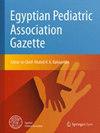Bardet-Biedl Syndrome: a case report of delayed diagnosis with variable presentation and role of genetic testing in definitive diagnosis
IF 0.5
Q4 PEDIATRICS
引用次数: 0
Abstract
Abstract Background Bardet-Biedl syndrome (BBS) is a rare multisystemic autosomal recessive (AR) disorder, which falls under the spectrum of ciliopathic disorders. As BBS is a very rare entity in India, its diagnosis is most often missed during early child visits. The lack of a syndromic approach for diagnosing genetic disorders by health care physicians is being considered a major blackguard. The following case report exemplifies how a patient presenting with multisystemic involvement should be evaluated to rule out syndromic association. Case presentation The authors here report a case of a male child aged 13 years presenting to Pediatrics Outpatient with complaints of learning disability and behavioral disturbances. During his initial assessment, features such as polydactyly, overweight, and vision disturbances were picked up by the pediatrician as an indication towards syndromic association. Soon a complete laboratory workup and various scans were done which revealed hepatic fibrosis and gonadal dysgenesis. Simultaneously, IQ testing was recommended which was suggestive of mild mental retardation. Bringing along all these clinical presentations a diagnosis of BBS was made. Post-diagnosis parents were counseled on recurrence risk and explained the importance of regular follow-ups and screening to improve quality of life. Conclusion This case report emphasizes the role of holistic multidisciplinary approach for diagnosing at early stage and better prognosis of BBS. Prenatal genetic counseling along with next-generation sequencing are a few potential measures to drop the incidence of this condition. Obesity and visual disturbances are a few concerns which if not handled early can result in unfortunate outcomes. Renal involvement in BBS is considered a deadly parameter which surely was not seen in this case. For all learning/intellectual disabilities, the triad of screening, clinical examination, and interdisciplinary approach can clinch in early diagnosis of a genetic syndrome.Bardet-Biedl综合征:1例延迟诊断的可变表现和基因检测在明确诊断中的作用
背景Bardet-Biedl综合征(BBS)是一种罕见的多系统常染色体隐性遗传(AR)疾病,属于纤毛病谱系。由于BBS是一种非常罕见的实体在印度,它的诊断是最经常错过的早期儿童就诊。医疗保健医生缺乏诊断遗传疾病的综合征方法被认为是一个主要的弊端。以下病例报告举例说明了如何评估出现多系统受累的患者以排除综合征相关性。作者在此报告一例13岁的男童以学习障碍和行为障碍为主诉到儿科门诊就诊。在他的初步评估中,儿科医生发现了多指畸形、超重和视力障碍等特征,作为与综合征相关的指征。很快,一个完整的实验室检查和各种扫描显示肝纤维化和性腺发育不良。同时,建议进行轻度智力迟钝的智商测试。根据这些临床表现,诊断为BBS。诊断后的父母被告知复发风险,并解释定期随访和筛查对改善生活质量的重要性。结论本病例强调综合多学科方法对BBS早期诊断和预后的重要作用。产前遗传咨询以及下一代测序是降低这种情况发生率的一些潜在措施。肥胖和视力障碍是几个问题,如果不及早处理,可能会导致不幸的结果。肾受累被认为是一个致命的参数,当然在本病例中没有看到。对于所有的学习/智力障碍,筛查、临床检查和跨学科方法可以在遗传综合征的早期诊断中起到关键作用。
本文章由计算机程序翻译,如有差异,请以英文原文为准。
求助全文
约1分钟内获得全文
求助全文
来源期刊

Egyptian Pediatric Association Gazette
PEDIATRICS-
自引率
0.00%
发文量
32
审稿时长
9 weeks
期刊介绍:
The Gazette is the official journal of the Egyptian Pediatric Association. The main purpose of the Gazette is to provide a place for the publication of high-quality papers documenting recent advances and new developments in both pediatrics and pediatric surgery in clinical and experimental settings. An equally important purpose of the Gazette is to publish local and regional issues related to children and child care. The Gazette welcomes original papers, review articles, case reports and short communications as well as short technical reports. Papers submitted to the Gazette are peer-reviewed by a large review board. The Gazette also offers CME quizzes, credits for which can be claimed from either the EPA website or the EPA headquarters. Fields of interest: all aspects of pediatrics, pediatric surgery, child health and child care. The Gazette complies with the Uniform Requirements for Manuscripts submitted to biomedical journals as recommended by the International Committee of Medical Journal Editors (ICMJE).
 求助内容:
求助内容: 应助结果提醒方式:
应助结果提醒方式:


